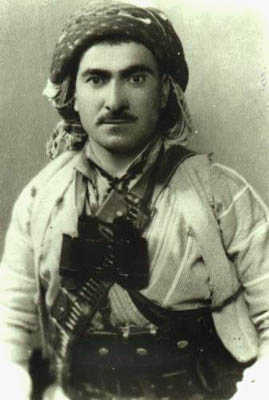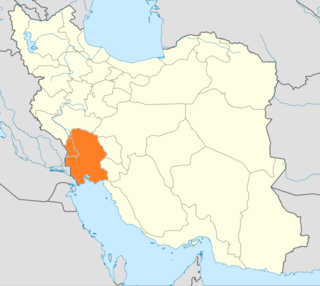Related Research Articles

Ansar al-Islam in Kurdistan, simply called Ansar al-Islam, also nicknamed the Kurdish Taliban, is a Kurdish Islamist militant and separatist group. It was established in northern Iraq around the Kurdistan Region by Kurdish Islamists who were former Taliban and former Al-Qaeda members, coming back from Afghanistan, in 2001. Its motive is to establish an Islamic state around the Kurdistan region and to protect Kurdish people. It imposed strict Sharia in villages it controlled around Byara near the Iranian border. Its ideology follows a traditionalist interpretation of the Quran and Salafism.

Iraq under Saddam Hussein saw severe violations of human rights, which were considered to be among the worst in the world. Secret police, state terrorism, torture, mass murder, genocide, ethnic cleansing, rape, deportations, extrajudicial killings, forced disappearances, assassinations, chemical warfare, and the destruction of the Mesopotamian marshes were some of the methods Saddam and the country's Ba'athist government used to maintain control. Saddam Hussein committed crimes of aggression due to his war against Iran and the invasion of Kuwait violating United Nations Charter. The total number of deaths and disappearances related to repression during this period is unknown, but is estimated to be at least 250,000 to 290,000 according to Human Rights Watch, with the great majority of those occurring as a result of the Anfal genocide in 1988 and the suppression of the uprisings in Iraq in 1991. Human Rights Watch and Amnesty International issued regular reports of widespread imprisonment and torture.

Ayatollah al-Sayyid Muhammad Baqir Muhsin al-Hakim at-Tabataba'i, also known as Shaheed al-Mehraab, was a senior Iraqi Shia Islamic Scholar and the leader of the Supreme Council for Islamic Revolution in Iraq (SCIRI). Al-Hakim spent more than 20 years in exile in Iran and returned to Iraq on 12 May 2003. Al-Hakim was a contemporary of Ayatollah Khomeini, and The Guardian compared the two in terms of their times in exile and their support in their respective homelands. After his return to Iraq, al-Hakim's life was in danger because of his work to encourage Shiite resistance to Saddam Hussein and from a rivalry with Muqtada al-Sadr, the son of the late Ayatollah Mohammed Sadeq al-Sadr, who had himself been assassinated in Najaf in 1999. Al-Hakim was assassinated in a bomb attack in Najaf in 2003 when aged 63 years old. At least 75 others in the vicinity also died in the bombing.

The Peace Companies are an Iraqi armed group linked to Iraq's Shia community. They are a 2014 revival of the Mahdi Army that was created by the Iraqi Shia cleric Muqtada al-Sadr in June 2003 and disbanded in 2008.

Mustafa Barzani also known as Mela Mustafa, was a Kurdish leader, general and one of the most prominent political figures in modern Kurdish politics. In 1946, he was chosen as the leader of the Kurdistan Democratic Party (KDP) to lead the Kurdish revolution against Iraq. Barzani was the primary political and military leader of the Kurdish revolution until his death in March 1979. He led campaigns of armed insurgency against both the Iraqi and Iranian governments.

The Kurdistan Free Life Party, or PJAK, is a Kurdish leftist anti-Islamic Republic of Iran armed militant group. It has waged an intermittent armed struggle since 2004 against the Iranian regime, seeking self-determination through some degree of autonomy for Kurds in Iran.

The 1991 Iraqi uprisings were ethnic and religious uprisings against Saddam Hussein in Iraq which were led by Shi'ites and Kurds. The uprisings lasted from March to April 1991 after a ceasefire following the end of the Gulf War. The mostly uncoordinated insurgency was fueled by the perception that Iraqi President Saddam Hussein had become vulnerable to regime change. This perception of weakness was largely the result of the outcome of the Iran–Iraq War and the Gulf War, both of which occurred within a single decade and devastated the population and economy of Iraq.
The Karbala provincial headquarters raid was a special operation carried out on January 20, 2007, by The Mahdi army, on the U.S. contingent of the Joint Security Station located within the Iraqi Police headquarters. The assault, which left five U.S. soldiers dead and three wounded, has been called the "boldest and most sophisticated attack in four years of warfare" and is furthermore notable for being one of the few instances when any sort of militants or insurgents have actually managed to capture U.S. soldiers since the Vietnam War.
The origin of Shia–Sunni relations can be traced back to a dispute over the succession to the Islamic prophet Muhammad as a caliph of the Islamic community. After the death of Muhammad in 632, a group of Muslims, who would come to be known as the Sunnis, believed that Muhammad's successor should be Abu Bakr, whereas a second group of Muslims, who would come to be known as the Shias, believed that his successor should have been Ali. This dispute spread across various parts of the Muslim world, which eventually led to the Battle of Jamal and Battle of Siffin. Sectarianism based on this historic dispute intensified greatly after the Battle of Karbala, in which Husayn ibn Ali and some of his close partisans, including members of his household, were killed by the ruling Umayyad Caliph Yazid I, and the outcry for revenge divided the early Islamic community, albeit disproportionately, into two groups, the Sunni and the Shia. This is known today as the Islamic schism.

Kurdish nationalism is a nationalist political movement which asserts that Kurds are a nation and espouses the creation of an independent Kurdistan from Iran, Iraq, Syria and Turkey.

Sheik Ahmed Bezaa Abu Risha is a Sunni leader in the Al-Anbar province, and led the movement of Sunni tribesmen known as the Anbar Salvation Council.
Special Groups (SGs) is a designation given by the United States military to the cell-based Shi'a paramilitary organizations operating within Iraq, backed by Iran. According to the United States these groups are funded, trained, and armed by the Iranian Quds Force, part of the Islamic Revolutionary Guard Corps (IRGC). According to the United States Department of Defense, 603 American troops in total were confirmed to have been killed by IRGC-backed Shia militias during the Iraq War.

The Iran–PJAK conflict is an armed conflict between the Islamic Republic of Iran and Kurdish rebels of the Kurdistan Free Life Party (PJAK), which began in 2004. The group has carried out numerous attacks in the Kurdistan Province of Iran and provinces of Western Iran. PJAK is closely affiliated with the militant Kurdistan Workers' Party (PKK), the primary opponent of the Republic of Turkey in the Kurdish–Turkish conflict. PJAK has been designated as a terrorist organization by Iran, Japan, Turkey, and the United States.

Asa'ib Ahl al-Haq, also known as the Khazali Network, is a radical Iraqi Shi'a political party and paramilitary group active in the Iraqi insurgency and Syrian Civil War. During the Iraq War it was known as Iraq's largest "Special Group", and is now part of the Popular Mobilization Forces (PMF), a group of Shi’ite militias that are close to Iran.

Arab separatism in Khuzestan refers to the century-long separatist Arab movement in the western part of the Khuzestan Province in Iran.

The Baqir Brigade, named after Shia Imam Muhammad al-Baqir, is a Syrian loyalist militia originating in the Aleppo Governorate that fights in the Syrian Civil War. One of the most prominent and largest pro-government militias from the Aleppo area and part of the "Local Defence Forces" network, the Baqir Brigade mostly consists of tribesmen from the al-Baggara tribe that traditionally supported the rule of the al-Assad family despite being mostly Sunni Muslim. Though the militia's fighters thus come from a largely Sunni background, many of them have converted to or are at least strongly influenced by Shia Islam. Indeed, the Baqir Brigade has been noted for its strong connections to the Lebanese Hezbollah, Iran, and various Iraqi Shia militias, and is thus generally considered to be a Shia or "Shi'ified" fighting force.

Occasional protests took place in Iraq during the years 2015–2018, in Baghdad and more southern Iraqi cities like Najaf, Nasriyah and Basra, over state corruption and political paralysis and deadlock, poverty, unemployment, power shortages, water shortages around Basra, failing public services, etc..

A series of demonstrations, marches, sit-ins and civil disobedience took place in Iraq from 2019 until 2021. It started on 1 October 2019, a date which was set by civil activists on social media, spreading mainly over the central and southern provinces of Iraq, to protest corruption, unemployment, political sectarianism, inefficient public services and interventionism. The protest then escalated into calls to overthrow the Iraqi government. The government, with the help of Iranian-backed militias used live bullets, marksmen, hot water, hot pepper gas and tear gas against protesters, leading to many deaths and injuries.
The 1979–1980 Shia uprising in Iraq, also known as the First Sadr Uprising, took place as a followup to the Iranian Revolution (1978–1979) in neighbouring Iran, as the Shia Iraqi clerics vowed to overthrow Ba'athist Iraq, dominated by (secular) Sunni Muslims - specifically the Saddam Hussein family. Saddam and his deputies believed that the riots had been inspired by the Iranian Revolution and instigated by Iran's government. The riots erupted in May 1979 and escalated in June - leading to thousands being tortured and killed in Najaf. The uprising subsided with the April 1980 arrest of the leader of Shia Iraqis, Muhammad Baqir al-Sadr and his subsequent execution.
References
- ↑ From Militant to Moderate, Mother Jones (magazine) , 2004-07-01, accessed on 2009-01-11